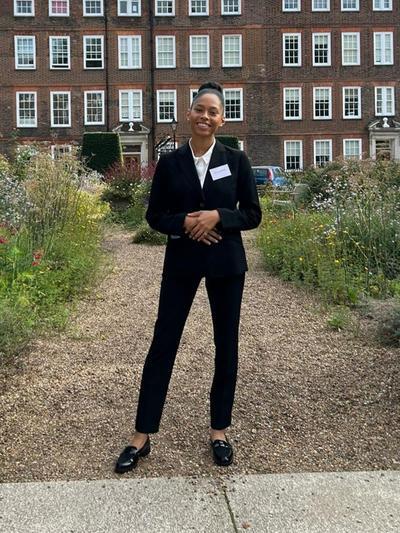
I saw the advert about The Big Legal Lesson via my university's employability portal. Young Citizens were looking for legal professionals or law students to help deliver free sessions in schools teaching young people about their rights.
I thought this was a great initiative because, when I was at school, I didn’t really have an official opportunity to learn about my rights. I did study government and politics, but that was out of my own interest. I think it's super important that everybody knows their rights. As a society, it's vital that we know what our responsibilities are to one another, and what freedoms we have too. I thought this would be really useful for young people going through school now, so I signed up to volunteer straight away.
After reading through the volunteer guide, I reached out to a local secondary school and arranged to deliver The Big Legal Lesson. It was a group of Year 8 students, and they were really keen, asking so many questions! When you're a teenager, you think, “what have I got to do with the government and changing laws? What real change can I make?” But The Big Legal Lesson activities really got them thinking about their rights and what is within their power to make a change in their immediate community.
The lesson gave them information about signing petitions, talking to your local MP and even making changes within school, encouraging them to think about how they could engage their teachers and headteacher to make a change. At the end, we got the students to think about a law they would like to change or implement if they had the power to do so. It showed them that it is actually quite easy to take little steps that can lead to a bigger change, and that was really exciting to see.
It is not my end goal to be a teacher, but I really enjoyed delivering the session, interacting with the young people and having discussions with them. It made me really happy that they were so engaged and giving really good feedback. I found myself learning as well because, though I know how our legal system works, having to inform other people about it gets you thinking about how to deliver it in a way that is accessible, doing away with all the legal jargon and just keeping it simple.
I'm not a teacher, but from my own experience at school, there are certain classes where you might learn about your legal rights or how Parliament works, but there is not a set, structured module that every school has to teach. I think that it needs to be more structured and form a fundamental part of the curriculum just like maths, English, geography or history. Not necessarily just law but our democracy too.
As adults, I think we should be careful not to underestimate the power of young people. Often, we might have the perception that some young people are uninspired and that they're not really interested, but that is just not the case at all. They are really bright people, with so much creativity and enthusiasm. They are going to be our future leaders, so we need to equip them and give them a reason to form a better society, both now and in the future. I think this work starts while they are still at school and so open to new ideas.
We need more opportunities both in and out of school for young people to be creative, explore their interests, and become active members of society. We can already see that lack of opportunities has a detrimental effect. Many young people think they are not believed in the system and feel completely overlooked. Now is the time to equip young people to shape their own future and let them know that we are thinking about them.
You can sign up to volunteer with The Big Legal Lesson here or find more ways to support Young Citizens.